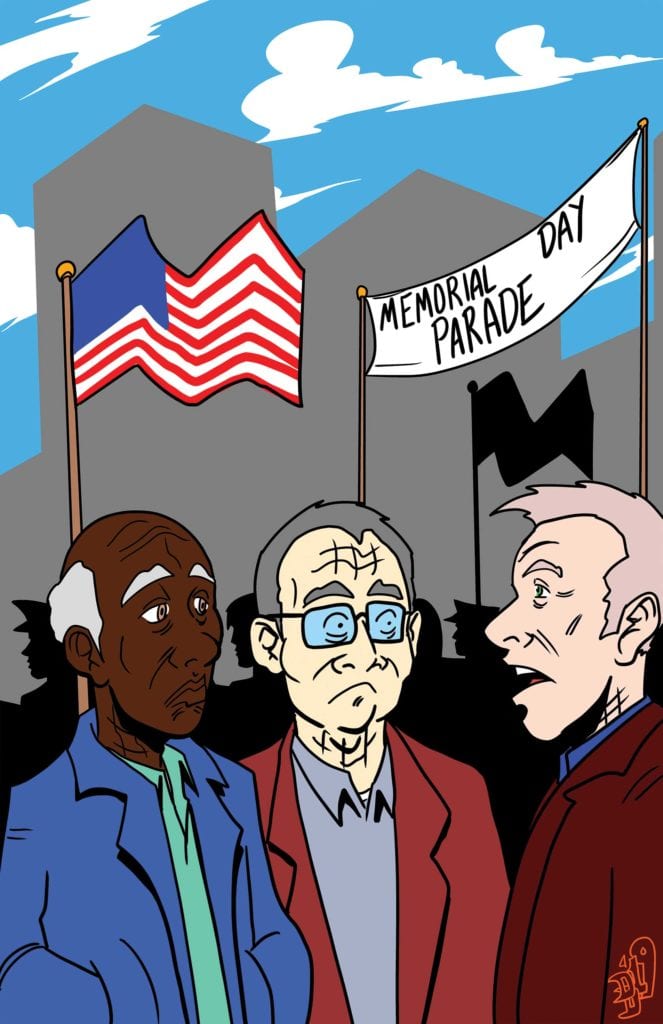
The recent celebration of Memorial Day had a nostalgic air, recalling the pervasive patriotism of Americans at the time of World War II. Perhaps that was because the country had lost its sense of inviolability then, and many Americans feel insecure now under the nation’s present leadership. Since World War II, Americans have been beset with wars and rumors of wars.
World War I (1914-1918) was supposed to be the war to end all wars. There was a sense of isolationism then that might have resulted in part from the fact that the United States was perfectly positioned to be protected by the Atlantic Ocean from political controversies in Europe and by the Pacific Ocean as a barrier against Asian uprisings. However, the Japanese attack on Pearl Harbor on Dec. 7, 1941, followed shortly by Germany’s declaration of war, ended that period of peaceful involvement in world affairs.
America had to concede its vulnerability and organize its citizens and resources for battles on two fronts. The development of a strong sense of patriotism was an essential element of marshalling the American forces. When World War II ended in 1945, there was a general expectation that Americans would return to their peacetime activities without the intense patriotism that kept the nation battle ready.
However, military conflicts continued to emerge. The Korean War (1950-1953) began only five years after the World War II armistice. Soon thereafter, the U.S. was involved in the Vietnam War (1961-1973), originally at the behest of France, our European ally. As the Asian conflicts abated the Middle East became a hot spot. Gen. Colin Powell became a celebrity as leader of the U.S. forces in Desert Storm, a well-devised battle from Aug. 2, 1990 to Feb. 28, 1991 to end Iraq’s invasion of Kuwait.
By this time, a major change had occurred in the nation’s military. The draft ended on Jan. 27, 1973. The U.S. now had a volunteer army. Military excursions no longer aroused the support of the total U.S. population. Soldiers who fought in Vietnam as the change was underway felt emotionally abandoned by the nation’s citizens.
Nonetheless, the U.S. was far from abandoning military intervention as a major aspect of foreign policy. In 2003 President George W. Bush sent U.S. forces into Iraq to oust the dictator Saddam Hussein. He predicted a brief encounter when the small nation of Iraq would experience the “shock and awe” of the American military might. What was to be a brief encounter lasted for 11 years directly, and placed the U.S. in the center of Middle East politics.
Even before the war in Iraq, terrorists had attacked the U.S. on Sept. 11, 2001, killing more than 3,000 persons in the New York World Trade Center. This led to the U.S. invasion of Afghanistan in retaliation for providing cover for Osama bin Laden and others involved in the attack on the U.S.
That battle has morphed into hostilities against Syria and Islamic State fundamentalists in the Middle East. So in a century from the end of World War I in 1918, the U.S. has become a country that is perpetually at war. From a close association between U.S. citizens and those in the military, people now seem to be detached from the continual military encounters.
Under such circumstances it would be impossible to sustain the spirit of patriotism that was common during World War II. It was clear that spirit had died when as a presidential candidate, Trump could insult a major war hero, Sen. John McCain, and yet go on to win the election in 2016.
There seemed to be a rebirth this Memorial Day of the spirit of respect and admiration for those who had sacrificed their lives for the republic. Perhaps the great political disruption impending between the Democrats and Republicans can be averted. Much will depend upon a general appreciation for the constitutional values that inspired so many Americans to risk their lives for the benefit of those who still endure.






